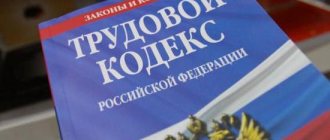Since 2021, officially employed pensioners continue to receive insurance payments without planned indexations. The law does not apply to social pensions and state security pension recipients.
As soon as a pensioner stops officially working, pension indexation will begin. If the pensioner was officially employed, there is no need to notify the Pension Fund authorities upon dismissal. Thanks to simplified reporting, the employer will notify the Pension Fund of the Russian Federation about the termination of employment.
Truth or myth: pensioners can be fined 120 thousand rubles for working part-time →
What are the risks of unofficial employment for a pensioner?
If a pensioner is employed unofficially, reporting on him is not carried out and the citizen continues to receive an indexed pension. And if the amount is less than the subsistence level, the pensioner receives additional social benefits.
Today, tax authorities closely monitor pensioners who work unofficially. In addition to additional assessment of unpaid taxes, the pensioner will face a fine of 120,000 rubles and administrative fines for unlawfully receiving additional subsidies and benefits.
What does an employer need to know?
Let's look at some circumstances and situations that may arise and what you need to pay attention to.
- You cannot be fired because of age . When concluding open-ended employment contracts with pensioners, the employer must understand that he does not have the right to dismiss a person because of his age if the elderly employee regularly goes to work, does not show up to the workplace drunk and there are no other reasons for dismissal provided for by the Labor Code. legislation for an ordinary employee.
- It is important to talk about the conditions when concluding a contract . It is necessary to inform the employee in advance that vacation and sick leave are not paid.
- You cannot terminate an open-ended contract and enter into a fixed-term contract upon reaching retirement age . In accordance with Part 1 of Art. 5.27 of the Code of Administrative Violations, an organization may receive a fine for violating labor and labor protection laws.
- For a fixed-term contract for seasonal work, it is necessary to provide vacation or compensation at the rate of 2 working days per month of work . If the employer did not provide leave to the pensioner (for example, there was an emergency, and the short term of the contract expired during this time), compensation still must be paid, since the employee has the right to claim this and can prove it in court.
- You cannot insist on a fixed-term employment contract . Restricting an employment contract with a pensioner by force is unacceptable. The employer does not have the right to insist on concluding a fixed-term contract if the volume of work to be done and working conditions allow concluding a contract for an indefinite period. If it is proven in court that a person of retirement age was forced to enter into a fixed-term contract, this contract may be recognized as unlimited (Clause 13 Resolution of the Plenum of the Supreme Court of the Russian Federation dated March 17, 2004 No. 2).
- Not wanting to employ a pensioner for an indefinite period, the employer cannot employ him several times in a row with the same job function as before . The company can be fined in the amount of 30,000 to 50,000 rubles and, as punishment, the organization’s activities can be suspended for up to 90 days (Part 1 of Article 527 of the Code of Administrative Offenses of the Russian Federation).
- A probationary period can be established and specified in the contract . This is possible, since pensioners are not included in the list of persons for whom a test for employment is not established (Part 4 of Article 70 of the Labor Code of the Russian Federation). However, such a period can only be established by agreement (Part 1 of Article 70 of the Labor Code of the Russian Federation). Otherwise, it will be considered that the pensioner was hired without a probationary period, and he can prove in court his right to continue working even if he fails the test.
- It is possible to hire a pensioner on a part-time basis in certain situations . The employer can initiate this mode of work only temporarily - for a period of up to six months, if the company is threatened with massive layoffs (Part 5 of Article 74 of the Labor Code of the Russian Federation).
A work team filled with employees of different ages is a condition for a warm family atmosphere and continuity. Retired workers can perform labor functions on an equal basis with young people, and also take on work that is less interesting to young people, which in any case will benefit the common cause.
Conclusions and recommendations
- When working informally, a pensioner should carefully choose an employer.
- A pensioner should look for places of official employment to avoid fines.
- After official employment, in order to receive an indexed pension, a citizen should quit his job and then get a job again. Thus, indexation of payments occurs only for non-working pensioners.
Author
Breslav Lev Andreevich
Your comments are very important and allow us to identify truly useful materials that are interesting to a wide range of people. Don't forget to rate publications and share your opinion with other site members.
Who is eligible
The first and main condition: you should not have an official job where you receive an official salary. This also applies to income from business activities, as well as unemployment benefits. But child care benefits do not count, so women who are on maternity leave can also apply for guardianship . Students and schoolchildren who are already 14 years of age are also entitled to this.
At the same time, it is not at all necessary to have family ties with the person you are going to court. But you must have Russian citizenship, permanently reside on the territory of the Russian Federation and be able to work yourself.
Hiring a pensioner without a work book and the nuances of the contract
Usually, when an employee starts work, the employer makes an entry in the work book. But, if the pensioner does not provide this document, then the agreement is concluded without it.
This agreement will be proof that the citizen is working and gaining experience.
In some cases, it is allowed to work without an appointment, but to do this they must enter into a part-time contract or a civil law agreement.
Information may not be provided if the pensioner cooperates with a private person. In this situation, the citizen does not have the right to independently make changes to the document. If there is no work record, then there are several options for solving the problem.
Briefly about pensions in the Russian Federation
Pension provision in the Russian Federation is based on insurance principles. In practice, this means that citizens are participants in the compulsory pension insurance system. Accordingly, the employer pays insurance contributions to the state fund for each worker. Their size is not fixed, but is tied to the amount of the employee’s salary, amounting to 22% in relation to it. Thus, it depends on what salary the citizen received.
Individuals who are individual entrepreneurs, as well as private practitioners (lawyers, notaries) pay contributions for themselves independently. At the same time, they retain the obligation to pay them for their employees if they act as employers.
The period for which insurance premiums were paid is called the insurance period, while the funds transferred to the Pension Fund of the Russian Federation are transformed into points that make up the IPC. It is these two indicators that will determine whether a citizen has the right to payments or not.
In 2021, to calculate insurance benefits due to age, you must have:
- experience – at least 10 years;
- IPC value is not less than 16.2.
Important! By the end of the pension reform initiated by the Government of the Russian Federation, the requirements for length of service and the number of pension points will be significantly increased.
What is the difference between a civil law contract and an employment contract?
Some employers replace the standard document with a civil liability agreement. If the employee and the employer are parties to the employment contract, then the civil liability document is signed by the principal and the attorney, the seller and the buyer, the customer and the executor.
The difference in working under a contract without a work book relates not only to the terms, but also to the responsibilities of the parties.
One of the main differences between the documents is the absence of social guarantees in a civil contract, whereas in an employment agreement the parties are required to spell them out in detail.
For example, there is no social package, the opportunity to receive remuneration, a fixed salary, or special clothing (if required). The employer is not required to provide a safe workplace, tools to do the job, purchase suitable materials, or monitor the number of work breaks.
In the employment contract, the parties are required to stipulate that employees comply with the rules of the work schedule and work schedule. It establishes the main function of a person, for example, driver or administrator.
The civil law agreement does not specify the functions of employees. If they are there, the court has the right to determine that the document is an employment contract and the employer violated human rights.
How to apply
To arrange care for a disabled person, you will need to submit a package of documents to the Pension Fund at your place of residence. This is your passport or birth certificate, work record book or certificate from an educational institution (with the date of graduation) and a certificate from the employment service stating that you do not receive unemployment benefits. You will also need SNILS, a tax certificate (proof that you are not an entrepreneur), an application for compensation and written consent from parents or guardianship authorities for those under 16.
From the person who needs guardianship, we need a passport, consent for the care of a specific person, a pension certificate, SNILS, an extract from the medical report on disability, as well as a certificate from a medical institution about the need for supervision.
The documents must be submitted by the person who is going to care for a disabled person. They will be reviewed within ten days.
Types of pensions
Citizens upon reaching retirement age have the right to receive one of the pensions:
- insurance;
- social.
The new payment calculation system began operating in 2021.
Insurance
An insurance or labor pension is assigned to women upon reaching 55 years of age, and to men from 60 years of age.
Every year the question of increasing this retirement threshold is raised, but so far the bill is only at the discussion stage.
From 2021, the labor pension is calculated for each person individually.
Its size will depend on how many points he has accumulated and how long he has worked.
The more contributions the employer makes to the employee’s account to the Pension Fund, the higher the size of his future pension will be.
According to the requirements, in order to receive an insurance pension, you must meet the following criteria:
- For 2021, the minimum length of service during which the employer transferred insurance contributions must be at least 9 years.
- The number of pension points must be at least 13.8.
The coefficients will increase annually.
By 2024, the minimum number of years of work experience must be at least 15, and the coefficient must be 10.
These measures are primarily aimed at combating shadow wages.
Social
A social pension is understood as a payment from the state to citizens who, for some reason, were unable to earn insurance coverage.
The following have the right to receive a social pension:
- Citizens who are disabled. In this case, the fact of incapacity for work must be documented.
- Disabled people.
- People who have reached retirement age but do not have the minimum length of service.
The age for assigning a social pension differs from an insurance pension.
For women it is paid from the age of 60, for men from 65. The size of the social payment is fixed, it is indexed annually.
Documentation
If a person has never worked and has no official income, he can still count on money, albeit small. There is no need to worry whether non-working people are entitled to a pension. To apply for it, you should contact the Pension Fund, which is located at your place of permanent registration. You cannot apply to any branch, otherwise your application for a pension will be denied. If you do not have experience, you will need to prepare the following documents.
- Passport of a citizen of the Russian Federation. Another document that replaces an identity card will also work.
- Citizenship document.
- SNILS.
- Help if you live in the Far North. It is necessary to confirm that you belong to the small nations living in the Far North. This document will allow you to receive payments 5 years earlier.
Important! To receive an additional pension (for example, due to the loss of a breadwinner), you must provide other documents. All certificates should be prepared in advance.
If a person did not work, what pension will he have in different regions of the country? People who live in Moscow and have permanent registration can count on bonuses. To do this, you will need to prepare more documents - it depends on them whether there will be additional payments:
- certificate of family composition;
- a certificate confirming that the citizen belongs to a disability group.
In some regions there are local allowances for those pensioners who were once unemployed. These payments help people reduce their utility bills and live in dignity. A non-working person should not worry whether he will receive a pension.
Summary
Changes in the country's pension legislation do not leave anyone indifferent. How to react to changes and what conclusions need to be drawn?
Compared to their peers who left work, working pensioners find themselves in a more advantageous position financially. They receive both a pension and a salary. But pensions are not indexed and pension payments become lower than they could be.
It turns out that every month a person loses part of his pension. This loss cannot be compensated.
Excited pensioners who continue to work turn to the Pension Fund. Everyone asks the usual questions:
- do you need to quit urgently so as not to lose the missing indexation coefficients,
- when is it better to quit
- How long after dismissal can you go back to work?
- Will the new size remain the same during employment?
It is clear that you can decisively eliminate the source of stress, leaving everyday work in the past. But most of our elderly compatriots work to increase their income, because it is extremely difficult to live on a pension.
Pensioners occupy vacant jobs, becoming competitors for young people. But if an older worker is of interest to the employer, then they will save the vacancy for a long-time employee and rehire him in a month.
What is a pension and who is entitled to it?
An old-age pension is a monthly cash payment due to citizens if they have the required insurance coverage and upon reaching a certain retirement age. For women it is set at 55 years old, for men - 60 years old (but some categories of citizens have the right to retire early. First of all, this applies to people working in difficult climatic conditions or in hazardous industries).
To receive good payments in the future, you must work for the specified number of years. That is, to begin with, a citizen works for the benefit of the state and pays taxes, and then the state pays him a pension benefit. If a person has worked officially all his life, he doesn’t have to worry - he has a length of service. But the situation is different for the unemployed, because they do not have official employment. Will there be a pension if you have never worked, we will consider this issue.
At what age can people without experience retire?
The law provides that payments under social pension security are assigned 5 years later than the generally established age. It turns out that in 2021 women will start receiving social payments at 60.5 years old and men at 65.5 years old.
However, this age is subject to increase every year. Thus, by the time the reform of the pension system is completed, the age for starting to receive social benefits will be 65 years for females and 70 years for the male part of the population.
Working hours and working conditions
The working hours for pensioners can be flexible and depend on what job the pensioner is applying for. Full working time. Normal working hours should not exceed 40 hours per week (Part 2 of Article 91 of the Labor Code of the Russian Federation). This applies to permanent, temporary and seasonal workers, as well as workers hired for the duration of certain work.
Pensioners are not among the persons for whom the employer is obliged to establish such a working time schedule in accordance with Part 1 of Art. 93 of the Labor Code. But this is possible at the request of a working pensioner. However, part-time working hours can also be established at the initiative of the employer.
Wages for pensioners working part-time are calculated in proportion to the time actually worked or depending on the amount of work they perform (for piecework wages)
Why aren't pensions indexed for working pensioners?
One of the guarantees for maintaining a normal standard of living and financial condition of older people is the indexation of pensions. Pension indexation means an annual increase in pension payments by the consumer price growth index (Part 6, Article 16 of Federal Law No. 400 “On Insurance Pensions”). In other words, with the help of indexation, the state helps pensioners “smooth out” the effects of inflation.
REFERENCE: The total amount of the insurance pension = fixed part (established by law) + insurance pension (depending on length of service, points, IPC). The fixed part of the pension and the cost of one pension point are indexed, with the help of which the amount of old-age insurance benefits is calculated.
However, indexation of the fixed part is due only to non-working pensioners. Since 2021, the annual increase for working persons receiving an old-age pension has been frozen on the basis of Federal Law No. 385 dated December 29, 2015. This act introduced Article 26.1 into Federal Law No. 400, which established the following: “pensioners carrying out <...> activities, during which they are subject to compulsory pension insurance<…>, the amount of the insurance pension, fixed payment to the insurance pension <…> are paid in the amount calculated <…> without taking into account indexation (increase) ... ".
REFERENCE : The suspension of indexation of pensions for working pensioners was associated with a budget shortage. The implementation of the pension reform in 2021 and the increase in VAT allowed certain amounts to be accumulated, so it is planned that indexation of insurance pensions will soon be returned to working pensioners. Read more about this below.
Let's look at how the size of the pensions of working and non-working people has changed in order to understand how much money a working elderly person loses as support from the state. For the calculation, we took a citizen who has accumulated 120 pension points*.
| Year of indexation | Amount of fixed payment (including indexation) | Indexation percentage | Pension point cost | Non-working pensioner | Working pensioner |
| 2014 | 3935,00 | 0,063 % | 64,10 | 11 627,00 | 11 627,00 |
| 2015 | 4383,59 | 11,40 % | 71,41 | 12 952,79 | 12 952,79 |
| 2016 | 4558,93 | 4,00 % | 74,27 | 13 471,33 | 12 952,79* |
| 2017 | 4805,11 | 0,00 % | 78,58 | 14 234,71 | 12 952,79* |
| 2018 | 4982,90 | 3,70 % | 81,49 | 14 761,70 | 12 952,79* |
| 2019 | 5334,19 | 7,06 % | 87,24 | 15 802,99 | 12 952,79* |
| 2020 | 5686,25 | 6,60 % | 93,00 | 16 846,25 | 12 952,79* |
ATTENTION : In practice, accumulated pension points are recalculated annually, so the size of the pension of a working pensioner will increase due to an increase in the number of points.
The example shows that a working pensioner in 2021 lost about 500 rubles every month. In 2021, this amount is already about 4,000 rubles. In general, from 2021 to the end of 2021, a working senior citizen will receive less pensions in the amount of more than 120,000 rubles.











